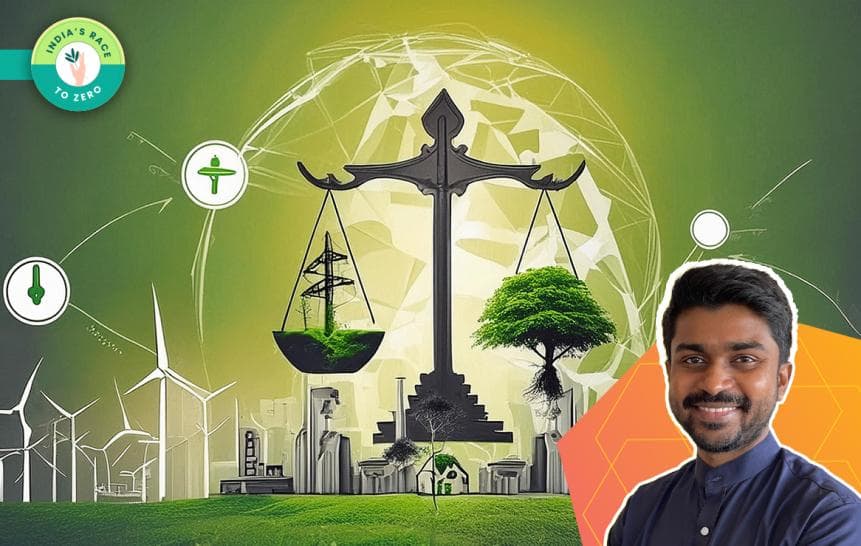Unlocking Carbon Credits
Building a greener planet by helping industries decarbonise & develop sustainable products
Kavin K Kandasamy

In the grand challenge against climate change, emissions stand out as the primary culprit. However, the story isn't just about emissions alone; numerous other factors weave into this narrative. When you look at any possibility of avoiding emissions, reducing emissions or removing emissions completely from the atmosphere, it can be tokened as something called carbon credits. Every ton of Carbon Emission avoided, reduced or removed and if it adheres to globally accepted carbon methodologies can be tokenised as one Carbon Credit for the purpose of monetising through climate attributes.
Imagine a world where every ton of emissions avoided, reduced, or removed could be transformed into a valuable asset. If it fits a certain scientific method, each of these actions can generate carbon credits. These credits aren't just numbers on a page—they represent real, tangible efforts to combat climate change. Companies purchase these credits to account for their own carbon footprint, allowing them to claim carbon neutrality. This means they can balance out their emissions with the positive work done by others. Credible companies engage in meaningful decarbonisation within their value chain and look to subsidise their remained impact through Carbon Credits.
In the past, businesses could profit while polluting the environment, but those days are behind us. Now, the focus is on making profits through sustainable and non-polluting means. This is where carbon financing comes in. It ensures that the necessary funds are available for projects dedicated to avoiding, reducing, or removing emissions.
For a long time, the world has pursued growth through methods that often lead to environmental destruction. As a rapidly growing country, India might feel tempted to follow the same path. However, we must recognise that the global climate crisis means that everyone's problems are interconnected. For instance, island nations face severe climate impacts more immediately than larger countries with extensive landmasses.
India is advancing in manufacturing, but it must remain conscious of its energy sources and carbon footprint. Sustainable growth is crucial to ensure that resources are not depleted, which would eventually hinder manufacturing progress. This means planning for reduced emissions and aiming for carbon neutrality and net zero emissions in the manufacturing sector.
Globally, the concept of a carbon tax is gaining traction. Developed countries are setting strict emissions baselines for their products. Any imported goods that exceed these baselines will incur a tax, regardless of their lower cost. Since India manufactures not just for itself but for the global market, it must adapt to this new carbon regime.
Organisations like Proclime are here to assist in navigating this landscape. Founded with a mission to tackle the pressing issue of global warming and climate change, at the heart of Proclime’s mission are three core areas: carbon projects, carbon trade, and climate investments. Though often simply referred to as "carbon," these initiatives are anything but simple. Proclime’s approach is to identify every possibility of avoiding, reducing, or completely removing emissions from our atmosphere. We help industries decarbonise and develop greener products, ensuring they meet international standards and contribute to a more sustainable future.
The other, and a key part of the evolving climate scenario is climate tech. When discussing climate tech, it's important to understand the varied impacts different technologies have on the climate. Some technologies directly avoid, reduce, or remove emissions, placing them on the frontline of the climate fight. Others work in the background, like those that quantify data to help people make informed decisions. Both types are crucial.
Climate tech covers a wide spectrum. It includes everything from monitoring and verifying climate impacts to spatial data analysis and carbon capture. Some companies focus on validating projects and monitoring sustainable agriculture, while others develop technologies to improve energy efficiency. All these efforts contribute to the climate landscape, whether they are labelled as climate tech or not.
There is a growing interest in financing greener, more circular products and solutions. Investors are increasingly putting their money into sustainable initiatives rather than traditional structures. Climate change is the biggest problem of our times, transcending across boundaries even more than issues like terrorism and cyber threats. It affects everyone, regardless of race or nationality, unifying us in the need for a solution.
Addressing climate change requires a multi-decade approach. More funding is flowing into climate solutions because investors understand that these solutions will be relevant for a long time, ensuring their market relevance and impact in the fight against climate change. Based on our five years of direct involvement and the data we see, it's clear that climate change is now a mainstream issue and will remain so for the foreseeable future. It affects everyone, from banking systems to flights experiencing turbulence, like the recent incidents with Singapore Airlines and Qatar Airways. Climate change is making food more expensive and causing more frequent climate events.
In India, climate change is now a part of daily life. Rain patterns are noticeably different compared to four or five years ago, highlighting the need for more projects to mitigate these issues. Is politics doing enough to address this problem? The answer is mixed. Many decisions are being made, but only a fraction are being fully enacted. Some decisions are bold, while others are constrained by various human dynamics and macro factors
India's climate policy is shaped by its federal system, where the central government designs plans, but the states are responsible for implementation. This division of responsibilities adds complexity, especially in a country as diverse as India.
There is no perfect climate policy in the world; each policy must work within its available resources and convert those into action. India is aware of its need for growth and is investing in green energy sectors like green hydrogen, while still relying on traditional energy sources like coal. Evaluating whether India's policy is the best is subjective and depends on individual perspectives.
However, several Indian states are turning climate challenges into opportunities. For example, Tamil Nadu sees climate issues as a chance to attract investments and sell solutions globally. Gujarat made significant strides in renewable energy, awarding 13 gigawatts of renewable power in a year—an unprecedented move worldwide. Similarly, Kerala is making great progress, especially in addressing coastal challenges. The Northeast has made significant strides in improving forest cover, with Telangana also transforming degraded ecosystems into dense forests. These achievements have led to positive effects on the economy, agriculture, and environment. Additionally, Maharashtra is also implementing a unique strategy for bamboo cultivation.
Overall, India's climate policy is pragmatic and forward-looking. While it may not be perfect, it is mindful of the country's resources, growth trajectory, and the need to address climate change. The important thing is that India has a plan and is actively working on it.
Climate is now a mainstream conversation, making it essential for companies to disclose not just their financial impact, but also their environmental, social, and governance (ESG) impacts, including their climate impact. Financial entities are increasingly prioritising organisations with pro-climate strategies, assessing what these companies are doing to mitigate climate change and enhance adaptation and resilience in their operations.
This shift means that funding is becoming more conscious. Financial institutions realise that if they don't invest in the right projects now, they may face a lack of viable projects or increased costs in the future. As a result, climate audits, carbon audits, and emission audits are becoming mandatory, especially for listed companies regulated by SEBI and large-scale MSMEs. These evaluations help determine an organisation's environmental footprint and influence funding decisions. Overall, the corporate world is increasingly scrutinising their operations' environmental and climate impacts.
The Indian government's latest initiative, the Carbon Credit Trading Scheme, known as the Indian CCTS, builds on global practices like Europe's long-standing Emission Trading Scheme. There are two main markets for carbon trading: the compliance market, where organisations are mandated to reduce emissions, and the voluntary market, where organisations choose to do so on their own.
India's new scheme evolves from the previous PAT (Perform, Achieve, and Trade) scheme. The PAT scheme focused on the type of energy organisations used—whether grey (fossil fuels) or green (renewable energy). Now, the Indian CCTS has shifted the focus to emissions. This means it quantifies the overall environmental impact, including the entire supply chain, not just the energy used in manufacturing.
Under this new scheme, companies that meet or exceed the emission reduction targets set by the government can trade their excess achievements as carbon credits in the compliance market. This system not only mandates emission reductions but also rewards companies that surpass their targets, making it a progressive step for India's environmental strategy.
Energy is a key part of the climate equation and crucial in transitioning from a grey to a green economy. In India, energy, especially renewable energy, has become a major focus and a sustainable investment option. The investment structures are well-evolved, offering payment guarantees, making it an attractive sector. However, energy isn't the only area needing investment. India should also focus on carbon removal projects, such as reforestation, mangrove restoration, and increasing green cover. Sustainable agriculture should be rewarded through carbon credits, and there should be investment in direct air carbon capture technologies, which can remove large-scale emissions from the atmosphere.
Companies like Proclime are already participating in these opportunities and creating co-investment prospects. This focus on carbon removal offers more permanence and long-term benefits for the environment. However, ProClime is not just about carbon—it’s about creating a world where businesses can thrive without harming the planet, where every effort to reduce emissions is recognised and rewarded, and where the fight against climate change is bolstered by innovative financing.
Increased disclosure is crucial for identifying and addressing our climate challenges. Both policymakers and businesses are recognising the importance of green cover, water resources, and energy efficiency. These areas are gaining a lot of attention.
India should view its climate resources as opportunities to be commoditised for the global market. This is where companies like Proclime come in, working alongside governments to capitalise on these opportunities. By focusing on these areas, we can turn our climate resources into valuable assets on the global stage.
